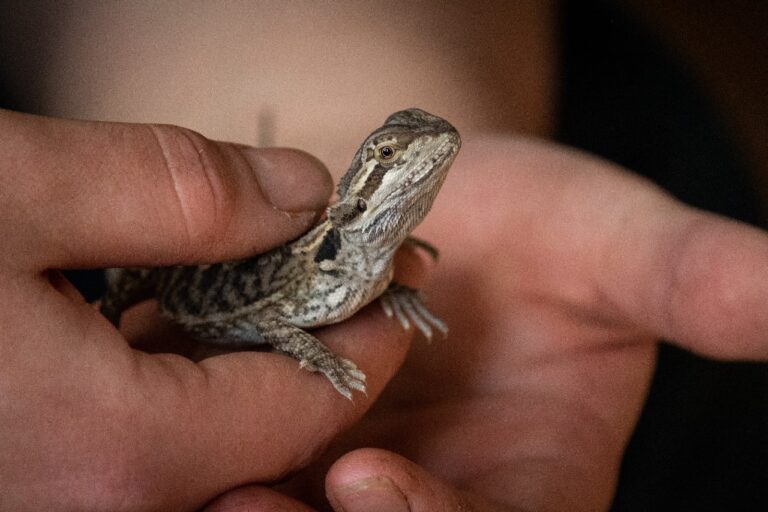What fruits and vegetables Can Bearded Dragons Eat? Well, let’s find out. Because of their unusual appearance and friendly demeanor, bearded dragons are made amazing pets. They need to eat properly to keep their lifespan and health. Bearded dragons are omnivores in the wild, eating a variety of fruits, vegetables, and insects. The question “Can Bearded Dragons Eat Cucumbers?” is asked. Pets need a balanced diet for good health. We’ll go over the fruits and vegetables that bearded dragons can eat in this comprehensive guide to help you pick a nutritious diet for your scaly friend.

Table of Contents
Understanding a Bearded Dragon’s Diet
Before getting into the specifics of which fruits and vegetables are suitable for bearded dragons, it’s important to understand the basics of their dietary requirements. Bearded dragons are opportunistic feeders, which means that given the opportunity, they will eat a variety of foods. The following categories can be used to categorize their diet:
- Insects: In the wild, a bearded dragon’s diet is insects. Crickets, dubia roaches, mealworms, superworms, and phoenix worms are popular options. For the dragon’s growth and overall health, these protein-rich insects are needed.
- Vegetables: A variety of green leaves and other vegetables should be consumed by bearded dragons. These offer fiber, vitamins, and minerals. However, not all vegetables are healthful or safe for children, so the essential is picking the one right.
- Fruits: Fruits are a wonderful treat for bearded dragons, but they have sugar content, so they should be fed in moderation. Fruits are high in vitamins and, when consumed in moderation, maybe a valuable nutritional supplement.
What Vegetables and Fruits Can Bearded Dragons Eat?
Here is the breakdown of fruits and vegetables Bearded Dragons can eat:
Vegetables for Bearded Dragons
Can Bearded Dragons Eat Vegetables? Yes, bearded dragons can eat different vegetables, like:
1. Collard Greens: The best and most good food is collard greens for bearded dragons. They are high in calcium and vitamin A, which are both necessary for their health. To avoid excessive oxalates, they must be balanced with other vegetables.
2. Mustard Greens: For high vitamins and minerals, the best options are collard greens and mustard greens. They add flavor to your dragon’s diet.
3. Kale: While kale is a healthy vegetable, it should be eaten in moderation owing to its high oxalate level, which can cause renal issues if ingested in a larger amount.
4. Turnip Greens: They are strong in calcium and low in oxalates, making them the best choice for your dragon’s diet.
5. Dandelion greens: They are a natural and healthful alternative. Make sure they are pesticide-free if you harvest them from your own yard.
6. Bell peppers: Bell peppers come in a range, and each one has a unique combination of nutrients. They are high in vitamin C and may assist you in diversifying your dragon’s diet.
7. Butternut squash: This vegetable is filled with vitamins and minerals and provides a balanced diet for your pet.
Fruits for Bearded Dragons
Can Bearded Dragons Eat Fruits? Yes, you can read it
1. Papaya: A fantastic fruit option for bearded dragons is papaya. It has a lot of vitamin A and digestive-aiding enzymes.
2. Blueberries: These little berries can be an occasional treat and are rich in antioxidants.
3. can bearded dragons eat strawberries: When fed sparingly, strawberries may provide your dragon a delicious treat and are high in vitamin C.
4. Mango: A tasty and nourishing addition to your dragon’s diet is the tropical fruit mango.
5. Apples: Due to their high sugar content, apples should only be fed in moderation. Before giving them to your pet, seeds should be removed and core.
6. Kiwi: Kiwi is a potent source of vitamin C and it would be a cool treat for your dragon.
7. Pears: Pears can be provided on occasion which are good sources of fiber.
8. Melons: Bearded dragons might be given watermelon and cantaloupe in moderation since they are hydrating foods.
Preparing and Serving Vegetables and Fruits for Bearded Dragons
It’s important to prepare vegetables and fruits properly and present them to your bearded dragon in a secure way:
1. Wash Everything Well: The first step in protecting the health of your bearded dragon is to wash everything before giving it. This essential step gets rid of harm or pesticides that can damage pets of yours.
2. Cut veggies into Appropriate Sizes: It’s best to slice or shred the veggies into bite-sized pieces to make for simple eating and reduce wastage. Smaller amounts make eating easier for your dragon.
3. Avoid Seasonings: While it may be tempting to season your dragon’s food with salt, sugar, or spices, it’s important to avoid the impulse. Due to their delicate digestive processes, bearded dragons may have health problems if they consume certain spices.
4. Ensure Variety: Just like humans, bearded dragons benefit from a diverse diet. By varying the vegetables and fruits you offer, you can ensure your pet receives a well-rounded nutritional intake and keeps mealtime interesting for them.
5. Monitor Consumption: Keep a tight eye on the amount of food that your bearded dragon eats. Overfeeding can result in obesity, which is a common problem in captive reptiles.
Conclusion
Proper nutrition is important for your bearded dragon’s well-being and happiness. To ensure that your scaly friend receives the necessary nutrients to grow, provide them with a variety of fruits, vegetables, and suitable insects. Always monitor your bearded dragon’s health when making dietary decisions and seek personalized advice from a reptile veterinarian or expert. With the right approach, you can enjoy watching your bearded dragon grow into a healthy and content reptile.

